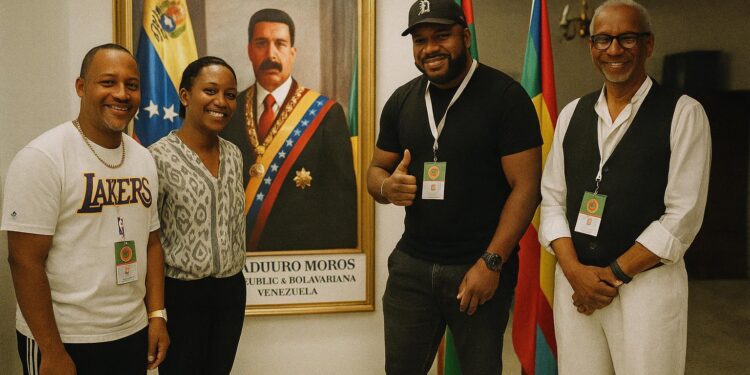A Cultural Bridge on the Congo
The restrained murmur of the Congo River has long accompanied Brazzaville’s diplomatic conversations, yet on 24 July its usual cadence will be complemented by the Afro-Caribbean timbre of Venezuela’s Madera ensemble. Invited under the auspices of the twelfth Pan-African Music Festival, the band’s arrival marks the first Venezuelan participation in Fespam, a milestone enthusiastically underscored by Ambassador Laura Evangelia Suárez during a recent press briefing (Venezuelan Embassy, Brazzaville). Her call for local audiences to attend, delivered in fluent French and Spanish, signalled more than a simple musical invitation; it hinted at an evolving South-South cultural axis linking Caracas and Congo.
An Orphanage as Soft-Power Venue
While most festival headliners set their sights on marquee auditoriums, Madera will perform at the Cardinal Emile-Biayenda Children’s Village in Kombé. The decision, endorsed by Congo’s Ministry of Culture and Arts, folds neatly into Brazzaville’s wider policy of leveraging culture for social inclusion. Officials stress that the orphanage, already supported by government welfare programmes, offers an intimate acoustic that places vulnerable children at the centre of international attention, a symbolic inversion of conventional protocol. In the words of a senior cultural adviser, the setting “demonstrates that the Republic’s development agenda is inseparable from its cultural diplomacy” (Ministry of Culture statement, 19 July).
Fespam’s Growing Geopolitical Canvas
Since its launch in 1996 with UNESCO backing, Fespam has matured into a broad canvas where African rhythms intersect with global strategic intent. This year’s edition, officially opened by President Denis Sassou Nguesso, features delegations from thirty-two nations. The inclusion of a Latin American group reflects Brazzaville’s desire to diversify partnerships beyond traditional Euro-African circuits. Regional observers note that Congo’s diplomatic playbook increasingly emphasises cultural pluralism, positioning the capital as a neutral rehearsal room for emerging south-hemisphere alliances (Central African Policy Review, July 2023).
Brazzaville’s Receptive Soundscape
Madera’s syncopated blend of salsa, batá percussion and joropo finds an unlikely yet receptive echo in Brazzaville’s storied neighborhoods, where rumba Congolaise has long thrived. On 22 July the ensemble tested local waters at the Palais des Congrès, weaving improvisations with Congolese groups Kongo Salsa and Tam-Tam Sans Frontières. Witnesses describe an audience quick to recognise the shared Afro-Atlantic heritage, applauding off-beat passages that mirrored their own musical DNA (Radio Congo, concert report). The following afternoon in Mayanga, spontaneous street choruses formed, underscoring how artistic dialogue often precedes formal diplomatic communiqués.
Venezuela’s Quest for African Partners
Behind the brass flourishes lies a strategic overtone from Caracas. Confronted with sanctions pressure, the Bolivarian Republic has intensified cultural outreach across Africa, seeking both symbolic allies and alternative trade corridors. Officials in the Venezuelan Foreign Ministry speak of an “Afro-descendant renaissance” as a cornerstone of their south-south policy (Caracas press dispatch, June 2023). Congo offers an appealing interlocutor: politically stable, rich in hydrocarbons and steadfast in asserting strategic autonomy. By applauding Madera on Congolese soil, Brazzaville reciprocates prior Venezuelan gestures, such as the scholarships extended to Congolese petroleum engineers in 2022.
Echoes Beyond the Stage
Should the trombones of Madera fade after the final encore, their diplomatic resonance is likely to linger. For Congo, the performance reinforces its stature as a cultural convenor able to host partners from across the Atlantic without ruffling established friendships. For Venezuela, the applause in Kombé will be relayed across Latin American media as proof of enduring global relevance. And for the children housed in the Emile-Biayenda Village, the concert promises a fleeting yet indelible memory that marries global solidarity with local aspiration. In an increasingly fractured geopolitical soundscape, such harmonies remain precious—and decidedly worth amplifying.












































